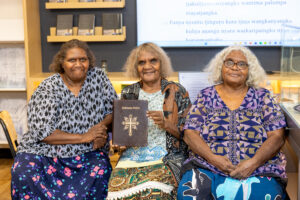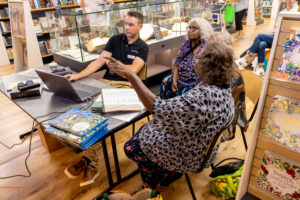In 2011, two extraordinary Anangu women, Katrina Tjitayi and Makinti Minutjukur, felt moved to begin the enormous task of translating the Old Testament into their Pitjantjatjara language. With the unwavering commitment of a team of Pitjantjatjara translators, the support of Bible Society’s Australian Languages Team and the generous contribution of Bible Society Australia’s donors, this project is making incredible progress. Once complete, this Old Testament translation will be brought together with the Shorter Bible from 2001 (containing the New Testament and 10-15% of the Old Testament) to complete the first Indigenous Australian language translation of the whole Bible.

BSA translator and Bible engagement coordinator, Dave Barnett, has coordinated the Pitjantjatjara Old Testament translation project for 12 years, working with over 30 Pitjantjatjara translators living in Adelaide, Central Australia, Darwin and WA. Bible translation is not only deeply meaningful to these Pitjantjatjara translators but also provides a vital means by which they can use and preserve their language.
Katrina and Makinti come from families with a deep history of Bible translation. “They looked at the Bible and realised there’s so much left that they don’t have. They were the ones that came to us and said, ‘Well, can you help us finish this whole Bible?’” says Dave. The project has since brought together 30 Pitjantjatjara translators, predominantly women, to translate the Old Testament passage by passage. Many of these translators are the children or grandchildren of those who worked on the Pitjantjatjara New Testament. “They’ve grown up with that legacy of translation, and it’s been communicated to them in spoken and unspoken ways—the importance of God’s word and having it in their language,” says Dave.
Dave highlights the strong faith of these women and their role as the spiritual pillars of their community. “They often share the Scriptures in church on Sunday. They teach their children and grandchildren these stories, it’s their faith that’s really driving this project,” he says. Despite their many responsibilities—whether working at the Ernabella school or the local clinic, caring for grandchildren, or managing urgent family needs—these women remain committed to the translation effort. “Some of the ladies stay up all night translating because it’s the only chance they get,” shares Dave. Their dedication is unwavering, even in the most difficult circumstances. “Some of them will be translating from their sorry camps [after the death of a loved one] and from hospital beds. They’re incredible, incredible ladies.”
This translation work has given Dave and BSA’s Australian Languages Team the privilege of learning from these faithful elders and serving the community. He has watched with fascination as translators such as Tjulyata work on books like Leviticus, connecting the foundational Old Testament laws about sacrifices with the Gospel message she grew up with. “[Tjulyata] rang me and said she’s been reading the Book of John and all this stuff that I had totally missed in Leviticus was helping her make sense of the Gospel. She was explaining all these insights into the Book of John based on what she’d been translating from Leviticus and Jesus being the Lamb of God,” shares Dave. He explains that Pitjantjatjara people are used to ritual, “they probably connect with them in a way far deeper than we do. In a way, they are closer to Hebrew people culturally walking in the wilderness, for example, than we are.”

The devotion of the translation team to this project is spiritual and deeply personal, and at the end of 2024, the Pitjantjatjara Old Testament translation project was 40-45% complete. Every book now has at least a first draft, and as each year progresses, new portions of Scripture are finalised, spurring on the translation team to complete the project with miraculous vigour. As the translators commit their lives to this demanding work, they trust that their children and grandchildren watching on will continue in the faith and one day take up the call to this ministry to their communities.